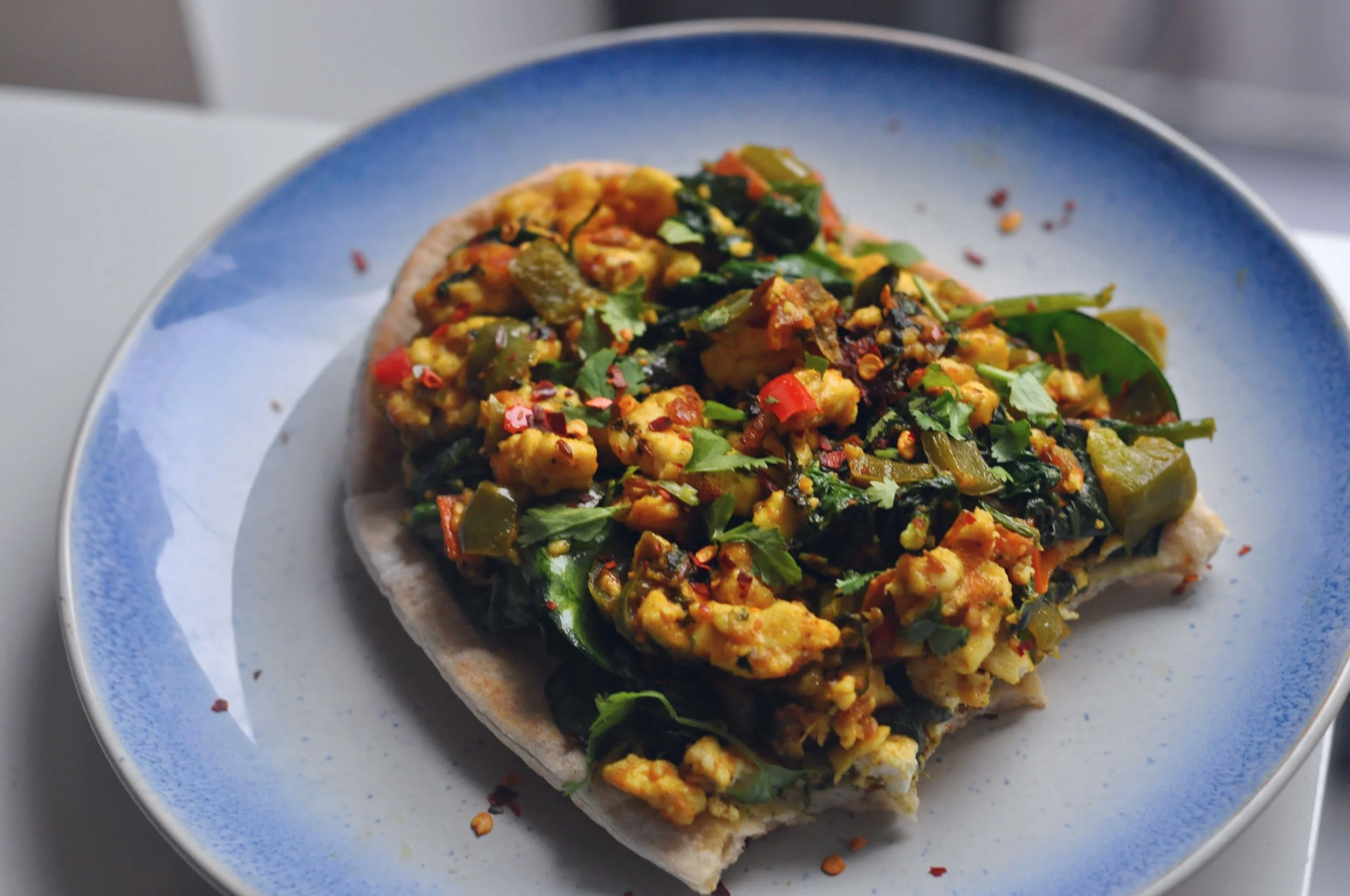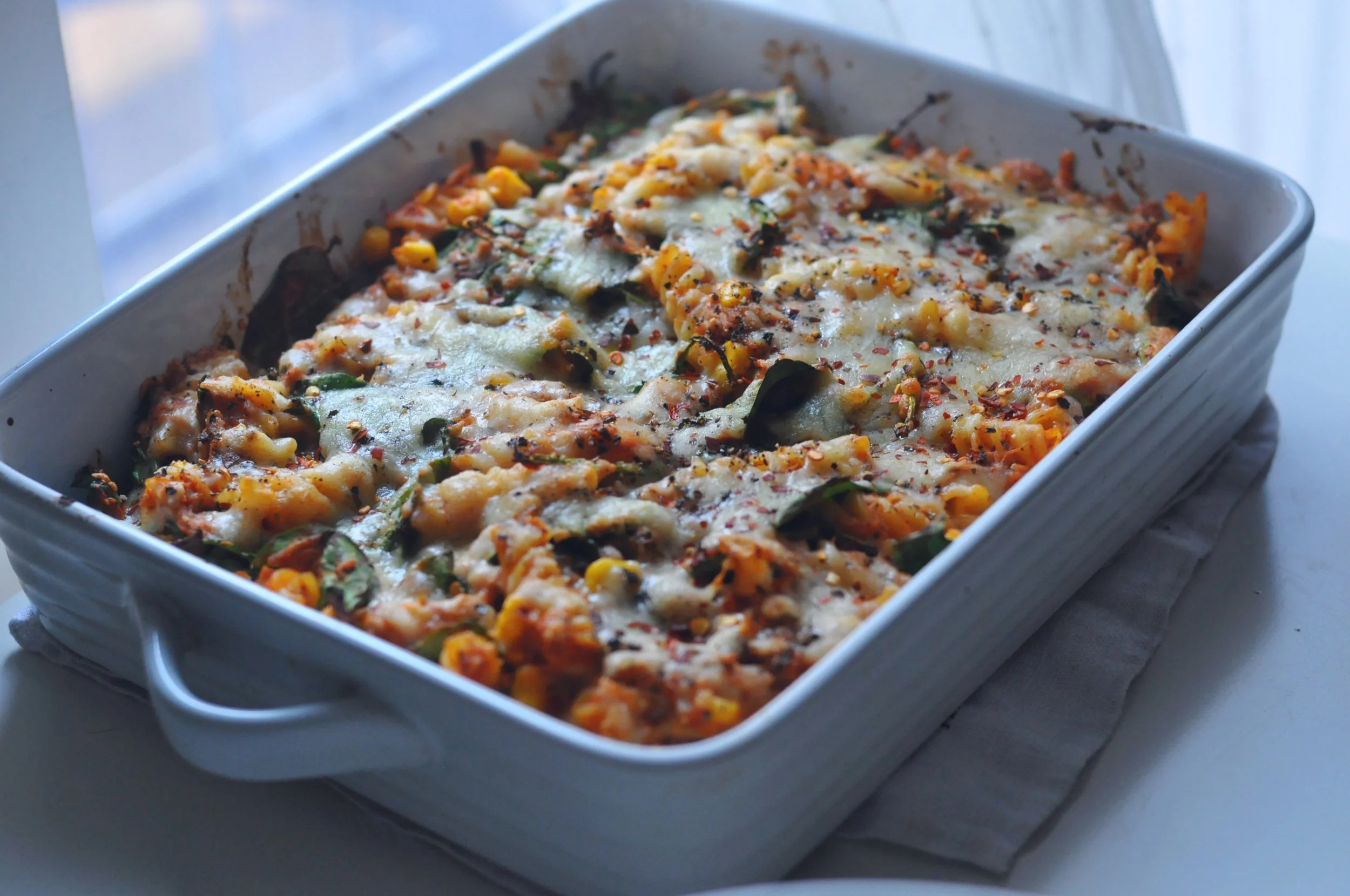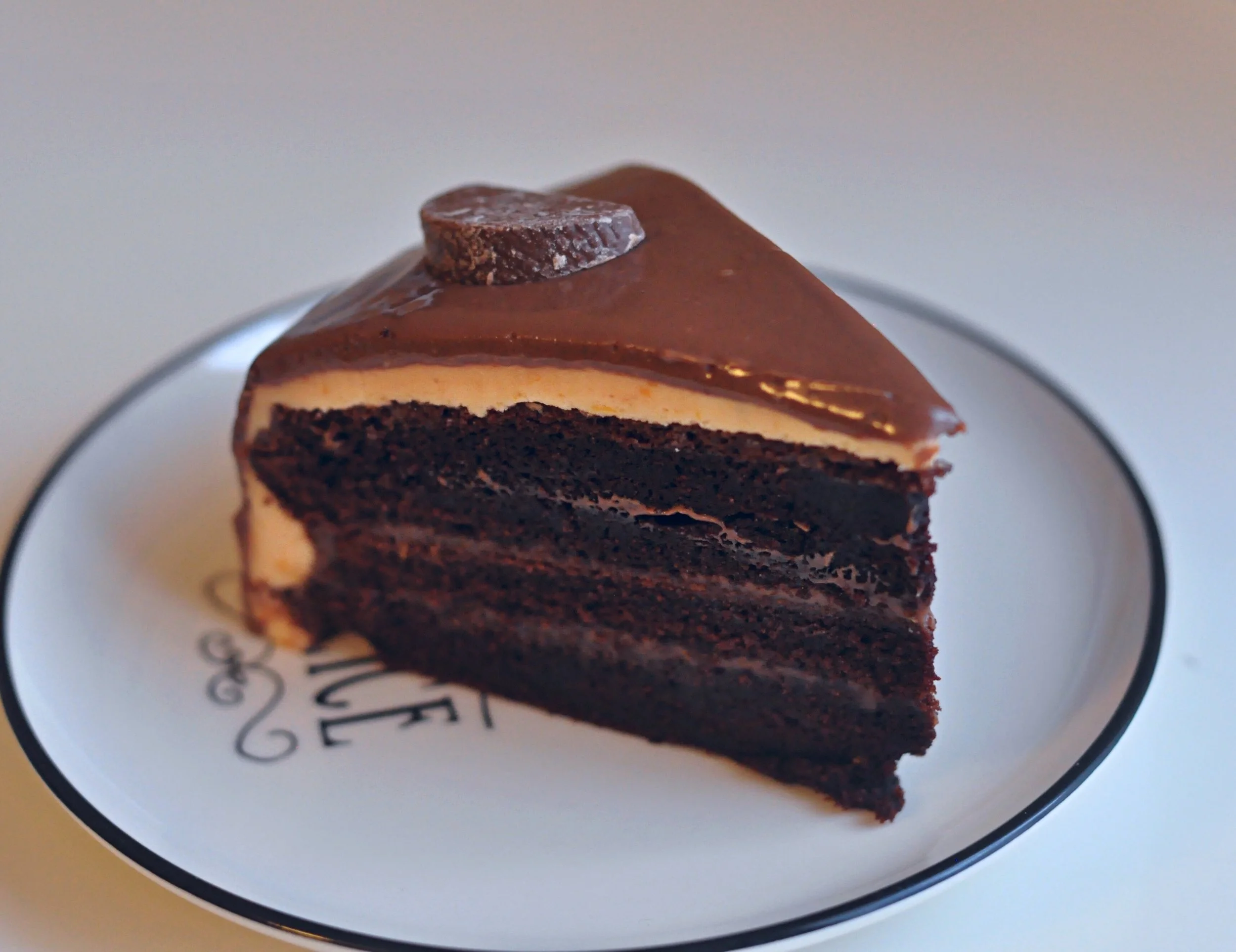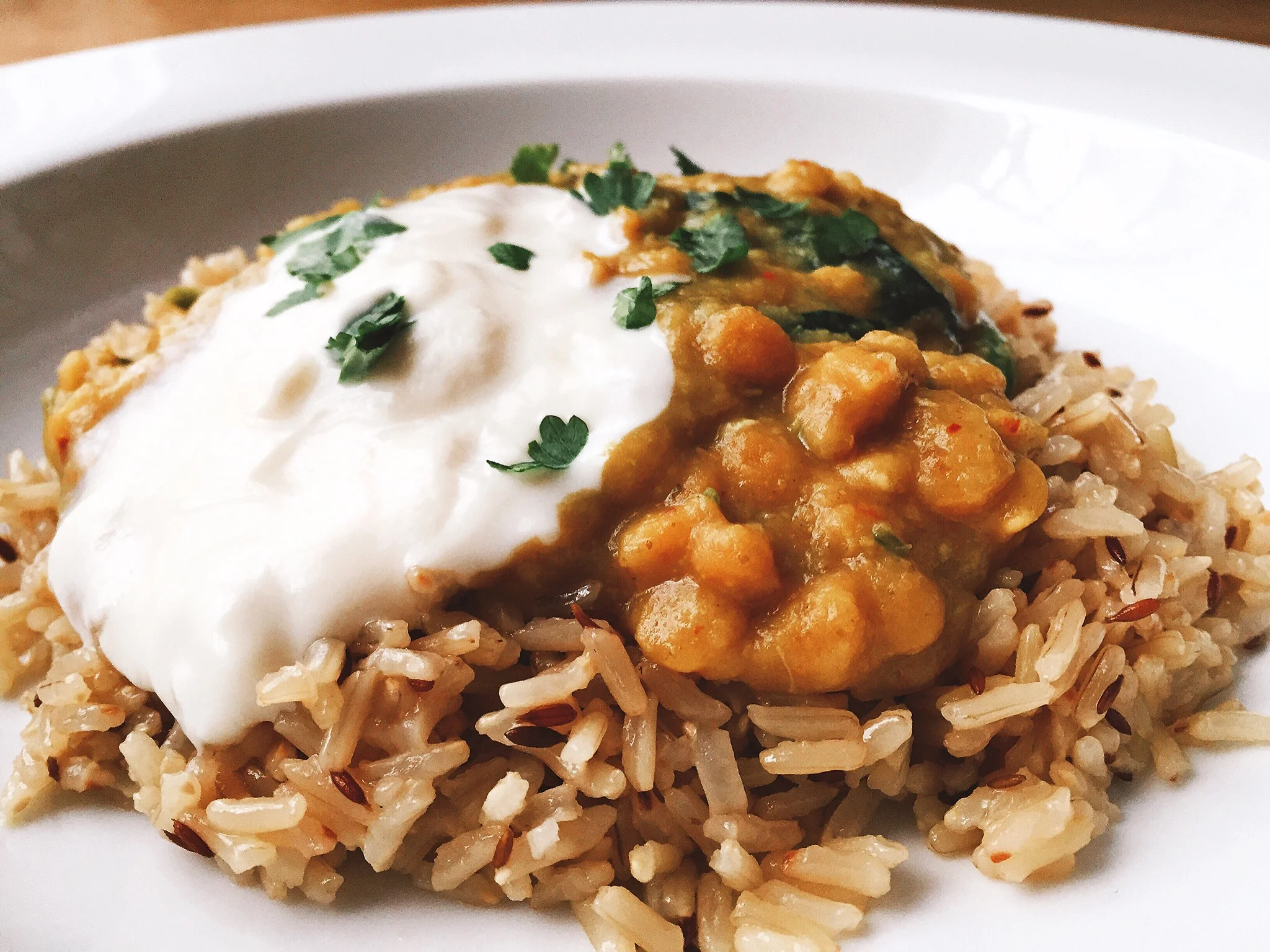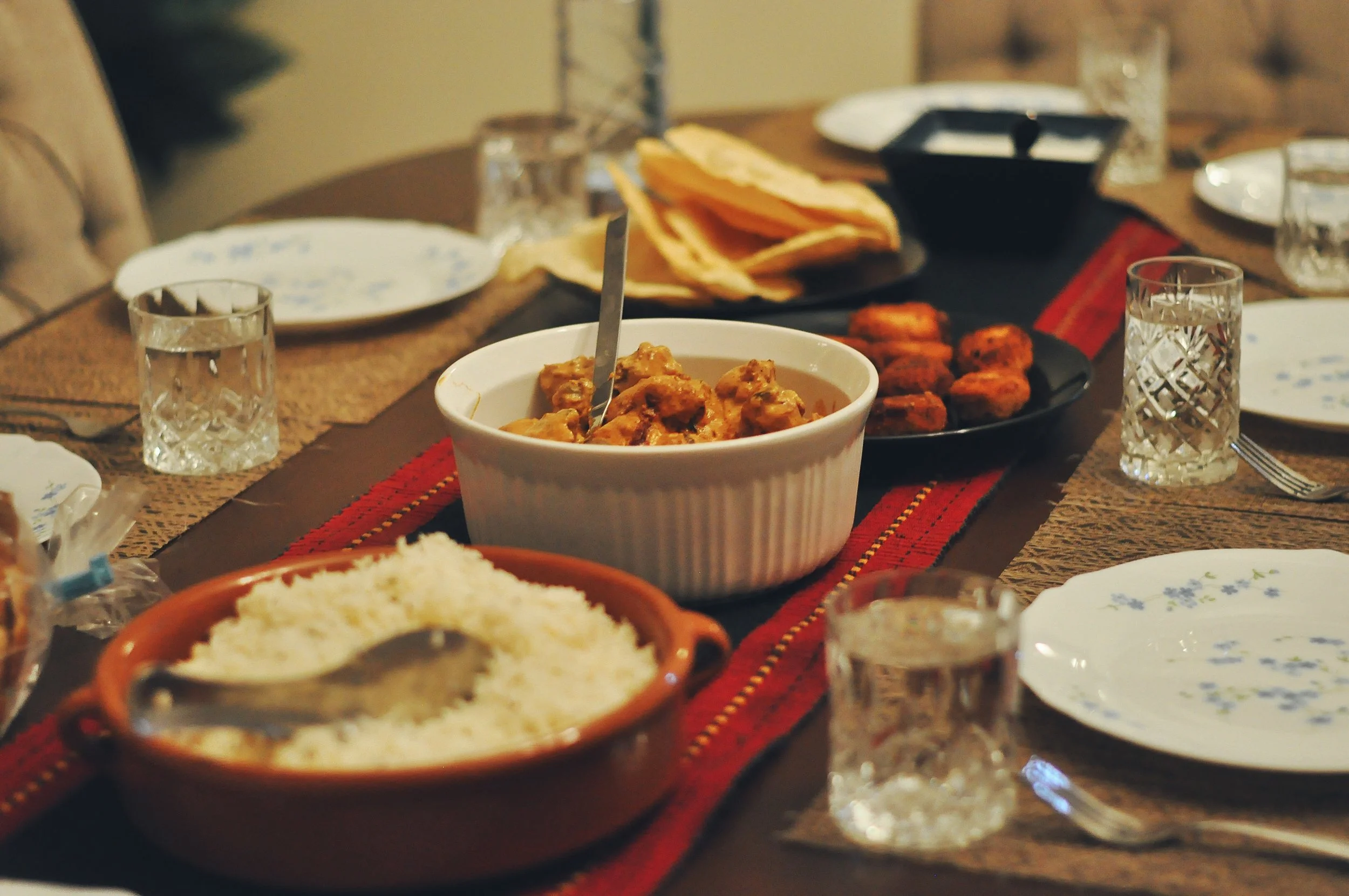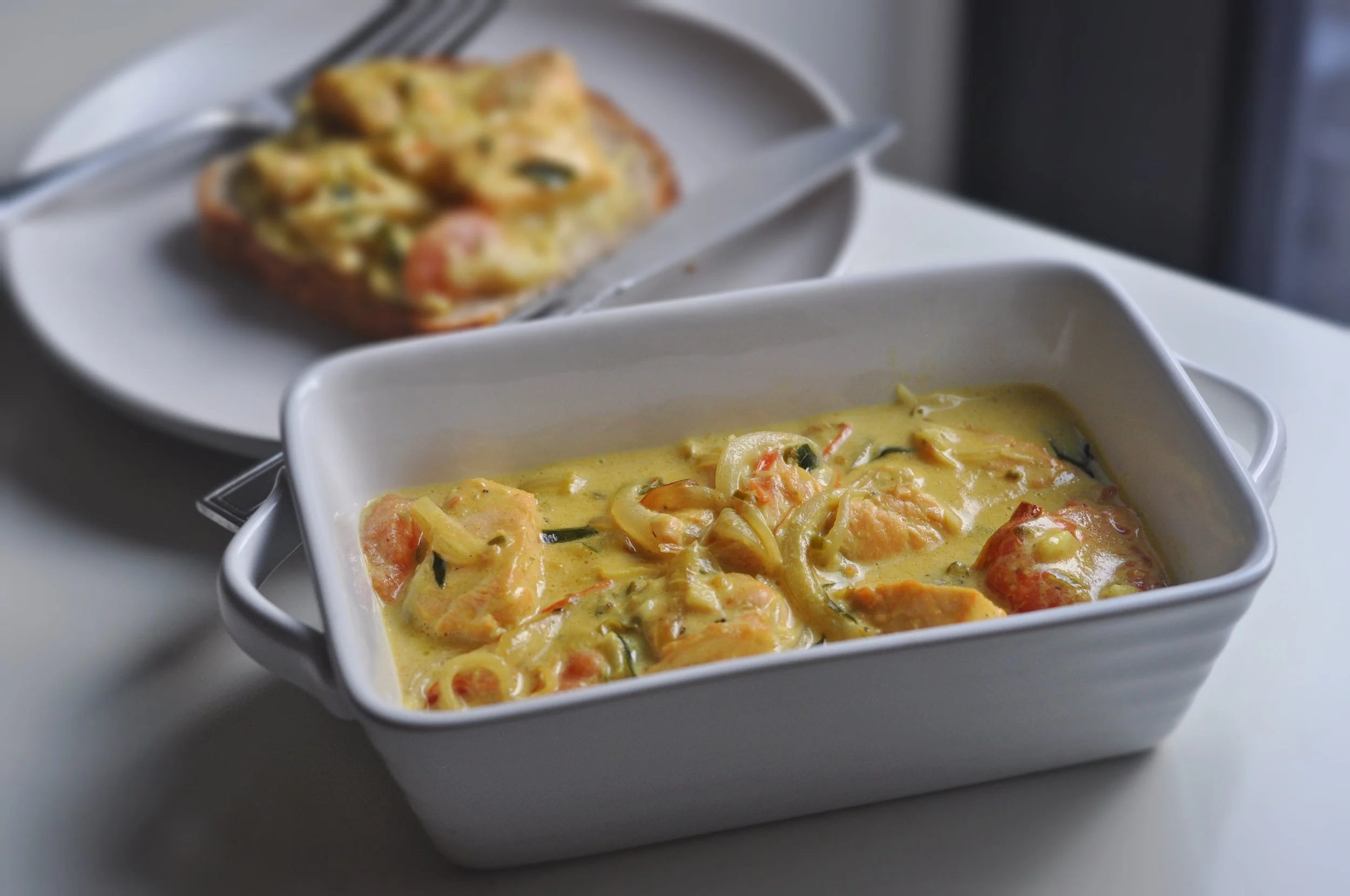Paneer bhurji
Have any of you seen that new Netflix show, Ugly Delicious? I haven't watched it yet but I like the idea. Delicious doesn't have to mean being as picture-perfect as a Japanese strawberry shortcake. Sometimes delicious is messy, like an overstuffed taco or an ice cream cone on a hot day. Enter paneer bhurji. Its bright colours may not win any beauty pageants and sure, your plate will eat more of the bhurji than you do... but it's worth it. It's the kind of quick, one pan, low effort dish that you can throw together for breakfast, lunch or dinner. You can have it in a wrap (paratha, chappati or tortilla) or with toast but I really like this on top of pita bread. Paneer is a kind of smooth Indian cottage cheese that looks a bit like tofu but has a much firmer consistency and takes on seasoning beautifully. I love the contrast of crumbly cheese and tender veggies over the chewiness of the toasted pita, the mildness of the cheese against the bold Indian spices. Say hello to your new chill weekend brunch. You won’t be sorry.
If you've been reading my blog for a while, you know I use the most tenuous of connections to link what I'm cooking/eating with what I'm thinking. So humour me when I say that paneer bhurji is a little like family; it's a mishmash of strong colours and flavours, there will be fall outs, it's not usually pretty but damnit if it isn't good and comforting. Today I'd like to talk about my parents.
When I was a teenager, my mother once very seriously told me she'd read an article about reincarnation that suggested certain enemies in your past life are reborn as your children in the next. It apparently forces you to resolve those issues and break the patterns that hold you back. Of course, we're Christian and reincarnation doesn't exactly figure in our beliefs. But the thought made me laugh and has always stayed with me. I don't know what happens after we die and frankly I don't really worry about it. But I do think there's a lot to be learned from families.
If you put four very different people in a house and force them to live together, of course there will be drama. That's why it makes such good TV (I'm looking at you, Terrace House). When you're young you don't see your parents as equal participants. It's your show and they're the lovable but often annoying extras. It's not that you don't love your parents or know their impact on you. It's that you both become so used to your respective parent and child roles that you forget to see each other as people. It’s only when you get older and move away from home that you realise the magnitude of their sacrifice. Parents are two people who make the decision to share their lives with one or more people they don’t even know yet let alone like, and to prioritise those little lives above their own. My grandad always jokes that marriage is a lucky dip but to be honest, so are children. I mean, have you read We Need to Talk About Kevin ?
Recently, my parents came to stay with Richa and me in London. We had a lot of fun and then we had one big row. It was an argument about nothing but if the four of us have one common failing, it’s that we’re all stubborn. And then my mum said something that struck me. She said, ‘Whenever Dada and I go out, if we go somewhere nice or eat something good, the first thing we talk about is how much we think you and Richa will like it.’ Such a simple thing but somehow it grazed my heart. It’s not like I don’t know how much my parents love me or that I don’t still believe my feelings were valid. It just made me realise that love makes everything else seem so small. Why was I arguing with my parents? My mother is someone who actually wakes up every morning and goes to sleep every night thinking about Richa and me. My dad is the kind of person who doesn’t give two figs about himself but will do and give anything to make his loved ones happy, to the point that I have to guard against his generosity so I don’t take advantage of it. They are good, open-minded and big-hearted people and everyday I realise a little more how lucky Richa and I am.
Parents aren’t perfect, they’re people. I feel like we make allowances for this with our friends and significant others but we don’t always do that with our families. A few years ago, I realised that my grandparents were getting older and needed a little extra loving. Lately, I’ve come to understand my parents do too. My mum was already married with two kids when she was my age. Looking at them now, I don’t see them as parents but as people with their own complex lives and feelings. I look at them and while I am grateful for our lives now, I can see that they have weathered so many storms and carried so many burdens without a word of complaint. I hope some day I can do the same for them. In the meantime, all I can do is try to be a better, kinder daughter.
Families aren’t perfect; sometimes they annoy you, sometimes they break your heart. With the latter, unlike with friends or significant others, it’s not as easy to just break ties and move on. And perhaps that’s the most important lesson families teach us: as long as there is a little love, enough to allow understanding to grow, all differences can be overcome.
I’m going to leave you with a few lines from Rumi:
Before you speak, let your words pass through three gates:
Is it true?
Is it necessary?
Is it kind?
Excuse all the little bites, photography is hungry work.
Paneer bhurji
Serves 4.
INGREDIENTS
225g paneer (in a block rather than cubed)
1 1/2 tablespoons oil
1 heaped teaspoon cumin seeds
1/2 onion, finely chopped
1 tablespoon ginger garlic paste
OR 3 cloves garlic, finely chopped
AND 1 inch ginger, finely grated
2 green chillies, finely chopped
2 tomatoes, diced into small pieces
1 green bell pepper, diced into small pieces
1 teaspoon garam masala
1/2 teaspoon turmeric powder
1/4 - 1/2 teaspoon chilli powder
Salt to taste (start with 1/2 teaspoon)
1 small bunch coriander, roughly chopped
2 handfuls baby spinach (optional)
freshly ground pepper and chilli flakes, to garnish
METHOD
Roughly crumble/shred the paneer with your fingers and then set aside.
In a large pan over medium heat, heat the oil. When hot, add the cumin seeds and let them brown. Next, sauté the onions until soft and translucent. Add the ginger, garlic and green chillies and cook for a couple of minutes, stirring well.
Add the tomatoes and bell pepper and cook for a further three to four minutes until the tomatoes are soft. Stir in the garam masala, turmeric, chilli powder and salt.
Add the paneer to the pan, tossing well with the mixture so it takes on all the flavours. Add more salt and pepper to taste and let it cook for three minutes.
Finally, as an optional step, throw in a handful or two of baby spinach and stir until it wilts into the mixture. Scatter with a few coriander leaves and serve hot with toasted bread or toasted pita.
